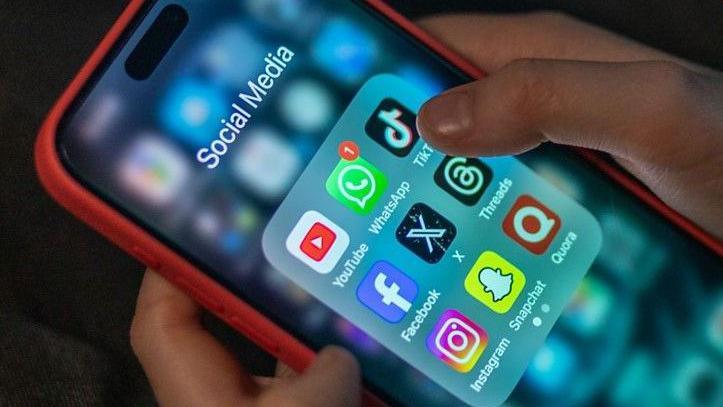How much are parties spending on social media?

Your postcode may be valuable to social media platforms as political parties customise their ads to reach you
- Published
With two days to go until voters head to the polls, many of Northern Ireland's parties have increased their spending on social media advertising.
Let’s take a look at what the five biggest parties in Northern Ireland spent from the party accounts on Meta (Facebook and Instagram) in the week 23 June - 29 June, according to the platform’s own estimates.
Meta publishes the spending figures in its Ad Library and tracks ads about social issues, politics and elections.
Your postcode may be valuable to social media platforms as parties customise their ads to reach you.
How much did they spend on Meta?
Sinn Féin Ireland €14,316 - While Sinn Féin Ireland’s account does cover the electorate in the Republic of Ireland, Meta notes the account spent £11,311 in the UK during that time period.
Alliance Party of Northern Ireland £6,091
Democratic Unionist Party (DUP) £3,155
Social Democratic and Labour Party (SDLP) £0 under its party account; for the account 'Colum Eastwood' spending is £1,405.
Ulster Unionist Party (UUP) £2,752
Source: Meta figures 23 - 29 June
This is what Meta says about its political advertising.
"Ads about social issues, elections or politics must include a disclaimer to verify who has paid for the ad. Disclaimers stay on record with ads for seven years in the Meta Ad Library.
"We require advertisers to verify the source of funds for every ad about social issues, elections or politics. An advertiser can declare multiple sources of funding."
How does it work?
Well, politicians or political parties are known as "advertisers" when they post campaign videos, graphics or posts of that nature online.
They can select the demographics, interests and behaviours of people that they want to see their ads.
Andrew Chadwick, professor of Political Communication and director of the Online Civic Culture Centre at Loughborough University, told BBC News NI that these final days will see a "significant ramping up" of online advertising to reach those "undecided voters".

Prof Andrew Chadwick says parties are trying to reach undecided voters at this time
“What we’ve learned from previous elections and the Brexit referendum is this is the period where you see significant ramping up of online advertising," Prof Chadwick said.
“It looks like advertising on Meta is going up and what that means is that a lot of the ads that are coming out now, from what we know about the ways in which parties operate, [are] trying to reach undecided wavering voters, who haven’t fully made up their minds and they’re thinking about the election quite carefully.
“Quite a lot of people do make their minds up about where they’re going to vote in that final week of the campaign. So those kinds of people are the ones that parties are trying to reach with paid advertising on Meta.
“I think people who aren’t going to vote, none of this is really going to change their mind. They’ve already decided they aren’t going to vote."
'Another opportunity'
The BBC, like other broadcasters, is not allowed to report details of campaigning or election issues while polls are open on the day of the general election.
Prof Chadwick has said this is something parties consider in their political communication.
“Political reporting starts to ramp down before polling day. So this opens another opportunity for the parties to focus on digital because they know they are not going to get the automatically guaranteed coverage that they’ve had in the broadcast studios so far in the campaign," he said.
While Meta covers Facebook and Instagram, which we can track, Prof Chadwick said it’s important to be aware of the digital activity in other parts of the social media space.
“It’s difficult to measure TikTok. They have a policy where they’ve forbidden paid advertising on the platform," he said.
“While Facebook ad spending is still important, because of the growth of TikTok, parties have gone back to the organic engagement factor, which we would have seen before they would have spent on digital advertising.”
As the final TV debates are over, politicians will spend the next few days knocking on doors and crossing constituencies on foot.
Online, this will be the last push on social media, a space which has been a significant element of campaigning in 2024.
